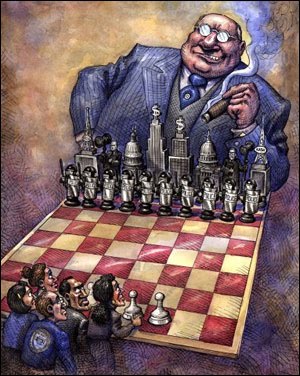Virulent stem rust could wipe out world’s wheat
A form of stem rust, known as Ug99, is threatening the world’s wheat crop – with wheat in Uganda, Kenya, Ethiopia, Iran and South Africa already affected.
Scientists fear the virulent strain is on the move and may show up soon in India and Pakistan. Once there it could be blown by the winds to North America, effecting crops in Canada and the United States, scientists suggest.
While wheat farmers here and in the United States have some options when it comes to planting wheat that is resistant to this form of rust, scientists are also trying to genetically breed new lines that are stronger and even more resistant, said Tom Fetch, stem-rust specialist at Agriculture Canada in an interview with the Star.
Ultimately, the long-term effects could be more devastating in the developing world where, unlike here, many farmers can’t afford to use fungicides to battle the rust, Fetch said.
According to Martin Carson, research leader at the USDA Cereal Disease Laboratory at the University of Minnesota, 80 per cent of the world’s wheat is susceptible to Ug99, which was found first in Uganda.
Ug99 is a strain of stem rust that burrows into the tissues of wheat and barley, damaging or killing the plant. The fungus saps nutrition from the host plant, he said, absorbing water and putting it under stress. It ends up all shrivelled and shrunken.
Its spread in a field can be rapid. The spores of the fungus germinate and penetrate a plant; in 10 to 14 days, a pustule erupts through the plant and it contains thousands and thousands of spores which can infect more wheat, Carson explained.
Since its discovery in Uganda it has travelled to neighboring countries, wiping out wheat crops, Carson said in an interview with the Star. Now scientists are in “a race against time” to develop new strains that are resistant to the pathogen, he said.
Scientists working at the Durable Rust Resistance in Wheat Project at Cornell University, funded by the Bill and Melinda Gates Foundation, are trying to do just that. But it will likely take between 8 to 10 years to develop a new line and have it ready for planting.
Meanwhile, given wind patterns and where the pathogen has turned up, wheat crops in India and Pakistan may be next hit. But conditions have to be just right for the pathogen to take hold, Carson said.
“It’s a disease where you have to have favourable environmental conditions as well,” he said. “It requires either rainfall or heavy dews for the fungus to penetrate the wheat.” Drought conditions and very high or low temperatures “wouldn’t be particularly favourable.”
If there is a worldwide outbreak affecting the world’s wheat production, it could have some very real “geopolitical repercussions,” including spiking prices for wheat and its products such as bread, Carson said.
http://www.thestar.com/news/world/article/870346--virulent-stem-rust-could-wipe-out-world-s-wheat?bn=1
_______________________________________________________________
 more on ug99, from last year:
more on ug99, from last year:"In 1999 agricultural researchers discovered in Uganda a new variety of stem rust—a fungus that infects wheat plants and wiped out 40 percent of U.S. wheat harvests in the 1950s. Millions of spores have spread from Uganda to neighboring Kenya and beyond to Ethiopia, Sudan and Yemen, wiping out as much as 80 percent of a country's harvest. In fact, the only thing that has stopped the rust from devastating the breadbaskets of China, India and Ukraine has been several years of drought in Iran."
http://www.scientificamerican.com/article.cfm?id=global-wheat-crop-threatened-by-fungus
_______________________________________________________________
from 2001:
"But some voices have begun to rally around GM's backers, notably the United Nations. The U.N.'s Human Development Report said in July that new technology, including GM seeds aimed at drought and pest resistance, was vital if developing countries are to conquer hunger and poverty.
``We have a long way to go. We have to prepare the world for introduction,'' said Darrell Hanavan, chairman of a U.S. wheat industry committee on biotechnology and a member of an advisory committee on GM wheat set up by Monsanto this year."
http://www.mindfully.org/GE/GE3/Wheat-Quandary.htm
________________________________________________________________
"There are huge risks to the smallholder rural African farmers if they adopt GM-crops.
Experience highlights the danger of dependency and monopoly control over GM seed by multinationals.
Large multinationals, Mushita said, have monopoly through their country agents, subsidiaries and joint-venture exercises on the price of the GM seed eroding the rights of the poor farmers to other alternatives.
Kevin Roussel, an anti-GMO campaigner of the South African Catholic Bishops' Conference, said new genetically engineered seed known as "suicide" or "terminator" seeds which were engineered to be sterile forced poor farmers to repurchase seed each year from the multinationals who have patented these 'genetic use restriction technologies."
These GM seeds, he said, included "junkie plants" that were dependent on chemicals sold by multinationals to flower, seed or sprout.
He said all farmers using GM crops in South Africa had to sign contracts with Monsanto, a giant GMO corporation, where they agree not to share their seed, only use Monsanto chemicals, buy new seed the following year and agree to set aside 25 percent of their land as a "refuge" area to control diseases.
Participants felt that GM seed would increase the dependency and indebtedness of smallholder farmers to multinationals eroding the communal rights, which entitled them to traditional crop varieties, which they would share freely without added costs.
The multinational giants include Monsanto, Aventis, DuPont and Syngenta (a merger of Astra Zeneca and Novartis) which dominate the global agro-chemical business as well as genetic engineering technologies.
It is estimated that between them, they account for nearly two-thirds of the $31 billion global pesticide market, one quarter of the $30 billion commercial seed market and virtually the entire GM seed market.
To push for further global control, these "Gene Giants" are merging with the $300 billion pharmaceutical industry as plants are being used to produce penicillin and insulin amongst other chemical and bacterial agents.
The major actors in the GMO debate are the United States, which supports it, and the European Union, which has largely opposed the wholesale spread of the GMOs."
http://www.gmwatch.org/index.php?option=com_content&view=article&id=4208:africa-must-resist-pressure-over-gmos-182006
________________________________________________________________
http://en.wikipedia.org/wiki/Great_Famine_(Ireland)#Potato_dependency
See there's the diversity they tell us we need, like their version of the word 'biodiversity' which basically involves pushing their little red button and exploding two or three zeros off the world population, then there's the good kind of biodiversity that we really do need, and the lack of which turned out to be the straw that broke the Irish back.
GM = global monoculture = ask the Irish for the rest.




































.jpg)



No comments:
Post a Comment